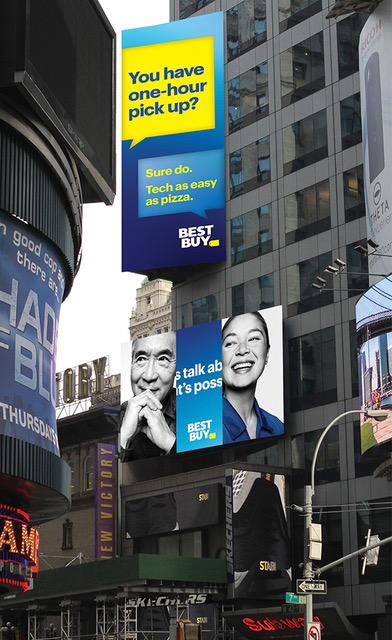
Best Buy is
looking to extend its recent winning streak, launching a major rebranding effort and new campaign starring its decidedly human Blue Shirts.
Themed “Let’s talk about
what’s possible,” the new effort positions its sales associates as pals who help people understand how “tech can help them achieve great, new things,” the company says in its
announcement. It hopes the new work can highlight the difference between shopping for new electronics with the help of a trained associate, versus going it alone in e-commerce.
“Telling the story of our people—and how we make a meaningful impact on customers’ lives—is at the heart of this work,” says Best Buy CMO Whit Alexander, in the
release. “Our people are our insurmountable advantage.”
advertisement
advertisement
The new campaign includes black-and-white TV ads slated to break May 13, with the only color coming from the
employee’s shirt; products are shot against a blue background. (It says Errol Morris shot the digital and TV ads, the director best known for such documentaries as “Fog of War” and
“The Thin Blue Line.”
The Minneapolis-based retailer also updated its logo for the first time in nearly 30 years in an effort to make it easier to read in digital
formats.
Best Buy, which is scheduled to release its first-quarter earnings later this month, has been on a tear of late, surprising many pundits. In its most recent results, it
reported that comparable-store sales jumped 9%,
“Best Buy has managed to capitalize on its ‘last man standing’ status in physical consumer electronics retail,
and has benefited from capturing market share as several of its smaller competitors (notably, Circuit City, RadioShack and HH Gregg) declared bankruptcy,” writes Michael Pachter, an analyst who
follows the company for Wedbush Securities. “And it astutely focused on improving its market position in home appliances with the acquisition of Pacific Sales and the rollout of its In-Home
Advisor program, and has managed to capture some market share as competitor Sears deals with declining sales.”
Still, he continues to rate the company as an underperformer
and is skeptical that consumers will buy into its Total Tech Support solution, priced at $200 a year. “We think tech products will become easier to use in the future, not more
complicated,” he adds, pointing out that the company is up against difficult, putting the possibility of positive sales comparisons for the year at risk.